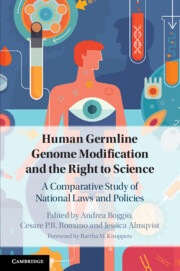 Human Germline Genome Modification and the Right to Science
Human Germline Genome Modification and the Right to Science Book contents
- Human Germline Genome Modification and the Right to Science
- Human Germline Genome Modification and the Right to Science
- Copyright page
- Dedication
- Contents
- Figures
- Tables
- Notes on Contributors
- Foreword
- Preface
- Acknowledgments
- Abbreviations
- 1 Introduction
- 2 The Governance of Human (Germline) Genome Modification at the International and Transnational Levels
- The Regulation of Genome Modification at the National Level
- Index
2 - The Governance of Human (Germline) Genome Modification at the International and Transnational Levels
Published online by Cambridge University Press: 15 November 2019
- Human Germline Genome Modification and the Right to Science
- Human Germline Genome Modification and the Right to Science
- Copyright page
- Dedication
- Contents
- Figures
- Tables
- Notes on Contributors
- Foreword
- Preface
- Acknowledgments
- Abbreviations
- 1 Introduction
- 2 The Governance of Human (Germline) Genome Modification at the International and Transnational Levels
- The Regulation of Genome Modification at the National Level
- Index
Summary
In this chapter, we review the key elements of the larger international and transnational framework within which the national legal regimes regulating human germline genome modification exist. Part I is a quick primer to international law and international human rights for the benefit of those who are not familiar with them. Part II presents the relevant norms of international bioethics law, including three main declarations adopted by UNESCO touching on human genome modification. It discusses also the relevant governance activities of the World Health Organization, Organisation for Economic Co-operation and Development and civil society, nationally and transnationally. Part III discusses relevant international human standards, and in particular the so-called ‘right to science’ and the ‘rights of science’. Finally, Part IV discusses how these rights can contribute to the emerging international regulatory framework. This chapter argues that, by itself, international bioethics law and its instruments provide a narrow and inadequate description of the range of human rights that must be taken into account in the conversation on the regulation of germline engineering. These instruments must be integrated with the broader international human rights law corpus. When they are integrated, five key principles emerge as foundations of the emerging regulatory framework: freedom of research; benefit sharing; solidarity; respect for dignity; and the obligation to respect and to protect the rights and individual freedoms of others.
Keywords
- Type
- Chapter
- Information
- Human Germline Genome Modification and the Right to ScienceA Comparative Study of National Laws and Policies, pp. 22 - 80Publisher: Cambridge University PressPrint publication year: 2020
- 1
- Cited by
